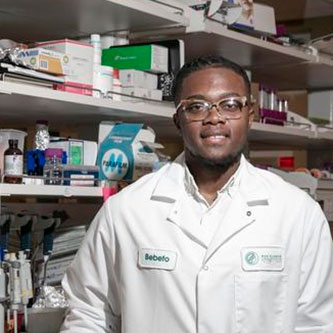Concentration in Biomedical Science
Students must earn a "C" or better in each course taken to fulfill a concentration requirement.
NOTE: Due to the significant overlap, students may not double concentrate in Biology and Biomedical Science.
Overview

The biomedical science concentration is designed for those students who wish to go on to graduate school, medical school, or who desire to work for biotech firms, government agencies, or other organizations in the biomedical field.
Advisory Board:
Dr. Kelsie Bernot
Dr. Lucia Carvelli
Dr. Andia Chaves Fonnegra
Dr. Erik Duboué
Dr. Conrad Toepfer
Dr. Catherine Trivigno
Courses
CONCENTRATION IN Biomedical Science
| Course # | Course Name | Credits |
|---|---|---|
| BSC 1010, 1010L | Honors Biological Principles with Lab | 4 |
| BSC 1011, 1011L | Honors Biodiversity with Lab | 4 |
| CHM 2045, 2045L | Honors General Chemistry I with Lab | 4 |
| CHM 2046, 2046L | Honors General Chemistry II with Lab | 4 |
| MAC 2311 | Honors Calculus I with Analytic Geometry | 4 |
| STA 2023 or MAC 2312 | Honors Introductory Statistics or Honors College Calculus II | 3-4 |
| PHY 2048 or PHY 2053 | Honors General Physics I or Honors College Physics I | 4 |
| PHY 2048L | Honors Gen Physics I Lab | 1 |
| PHY 2049 or PHY 2054 | Honors General Physics II or Honors College Physics II | 4 |
| PHY 2049L | Honors Gen Physics II Lab | 1 |
| CHM 2210, 2204L | Honors Organic Chemistry I with Lab | 4 |
| CHM 2211, 2205L | Honors Organic Chemistry II with Lab | 4 |
| PCB 3703, PCB 3703L or BSC 2085, 2085L | Honors Human Morphology and Function I with Lab or Anatomy and Physiology 1 with Lab | 4 |
| PCB 3063 | Honors Genetics | 4 |
| Electives | 14 | |
| IDS 4970 | Honors Thesis (two semesters) | 6 |
| Total Credits | 72-73 |
Electives
Students are reminded that they need 42 upper-level (3000 or 4000) credits.
| Course # | Course Name | Credits |
|---|---|---|
| BCH 3033 | Honors Biochemistry | 3 |
| BSC 3452 | Honors Experimental Design and Data Analysis* | 3 |
| BSC 4403L | Honors Biotechnology Lab | 2 |
| BSC 4442C | Honors Molecular Ecology | 3 |
| BSC 4915 | Honors Dir Ind Res in Biology | 1-3 |
| BSC 4930 | Honors Special Topics in Biology (Must be related to biomedical science—approval of advisor required) | 1-3 |
| BSC 4930 | Honors Neurobiology of Mental Illness | 3 |
| BSC 4930 | Honors Introduction to Neuroscience | 3 |
| BSC 4930 | Honors Drosophila Geners and Behavior (CURE) | 3 |
| MCB 3020 (w/3020L) | Honors Microbiology (with Lab) | 3 (4) |
| PCB 3411 | Honors Animal Behvior | 3 |
| PCB 3704, PCB 3704L or BSC 2086, 2086L | Honors Human Morphology and Function II with Lab or Anatomy and Physiology II with Lab | 4 |
| PCB 4102 | Honors Molecular Cell Biology | 3 |
| PCB 4102 | Honors Cell Biology | 4 |
| PCB 4233 | Immunology | 3 |
| PCB 4234 | Honors Biology of Cancer | 3 |
| PCB 4253 | Honors Developmental Biology | 3 |
| PCB 4673 | Honors Evolution | 3 |
| PCB 4832C | RI Neurophysiology | 3 |
| PCB 4841 | Honors Cellular Neuroscience | 3 |
| PHI 4633 | RI: Biomedical Ethics | 3 |
| PSB 3441 | Honors Drugs and Behavior | 3 |
| PSB 3340 | Honors Behavioral Neuroscience | 3 |
| PSB 4003 | Introduction to Neuroscience Research | 3 |
| PSB 4243 | Honors Neuroscience of Addiction | 3 |
| ZOO 2303, 2303L | Honors Vertebrate Zoology with Lab | 4 |
| ZOO 4742 | Honors Principles of Human Neuroanatomy | 3 |
Note: Students in the Max Planck Honors Program may count Introduction to Neuroscience Research (PSB 4003, 1 credit) and two distinct MPHP Enrichment courses (1 credit each) as their 3 credit, Biology elective.